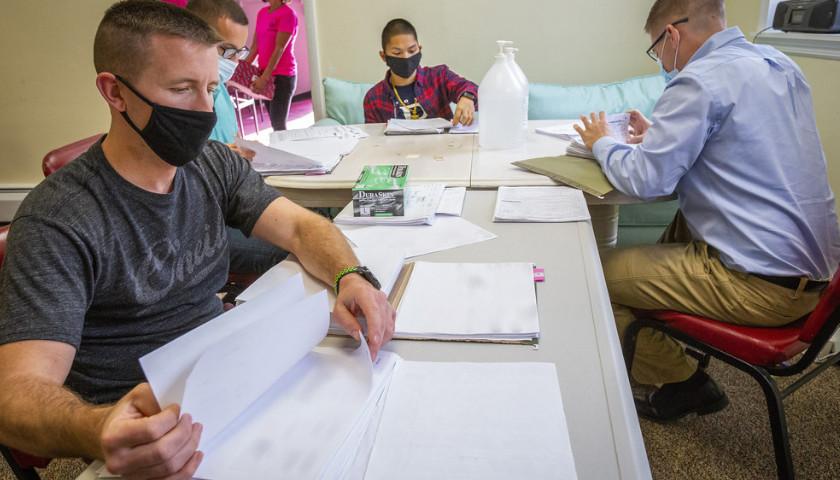A Pennsylvania court this week issued an opinion allowing litigation attempting to block the use of electronic voting devices in Philadelphia, Northampton and Cumberland counties to proceed.
Commonwealth Court Judge Kevin P. Brobson (R), currently a candidate for Pennsylvania Supreme Court, ruled that two advocacy groups and several state residents have standing to challenge the use of ExpressVote XL systems.
In January 2020, two nonprofits called the National Election Defense Coalition (NEDC) and Citizens For Better Elections, along with the 13 individual petitioners brought the case against Kathy Boockvar (D), who served as Pennsylvania secretary of state that year and has since resigned. The plaintiffs have argued in favor of decertifying the ExpressVote XL machines, alleging security and utility problems.
Petitioners’ claims include the machines being vulnerable to manipulation, resulting in possibly different votes being recorded than those selected by a voter. They assert that the devices’ disk drives and memory cards with election results can be accessed by wrongdoers with the ability to pick the machine’s locks. The plaintiffs also say the machines are insufficiently protective of voters’ privacy.
Petitioners had recalled that when Philadelphia and Northampton counties put their ExpressVote machines to use in November 2019—Cumberland had not received the new devices—some of the contraptions actually failed to tabulate votes correctly. The devices, the plaintiffs have argued, make it probable “that a significant number of votes will not be counted accurately or at all.”
As such, the petitioners claim that the voting systems violate several provisions of the Pennsylvania Election Code and that they infringe on rights bestowed by the state Constitution guaranteeing “free and equal elections and the free exercise of the right to suffrage” as well as all civil rights. The federal constitutional guarantee of equal protection of the law was also cited, because “while [the plaintiffs] are compelled to vote in counties using the ExpressVote XL [machines], other registered voters in Pennsylvania may vote in precincts or counties using voting systems, such as verifiable paper ballots that are counted by hand or by optical scanners, that do not suffer from the defects identified in [the] Petition.”
Counsel for former Commonwealth Secretary Boockvar argued that the plaintiffs did not establish a firm enough factual basis for contending that the voting machines threatened either accuracy or privacy. Boockvar also maintained that the citizens and groups who brought the suit lacked standing to do so because they don’t clearly assert that other jurisdictions in Pennsylvania are free of the problems alleged to have occurred in Philadelphia, Northampton and Cumberland counties.
Brobson largely dismissed Boockvar’s arguments.
“[W]e we hold that Petitioners have alleged sufficient facts at this stage of the litigation to proceed on their constitutional claims,” the judge wrote. Addressing the issue of standing, he insisted, “Petitioners need not demonstrate that they are the only people that use the ExpressVote XL machines, nor do they need to show that they face a heightened risk of not having their votes counted or having their privacy infringed upon as compared with voters in counties that use other voting machines based on differences between the voting machines.”
The NEDC is a left-leaning organization that has partnered with progressive groups such as the Brennan Center for Justice, Common Cause, the Michigan Election Reform Alliance, the NAACP, Public Citizen, Jesse Jackson’s Rainbow Push Coalition and the Transformative Justice Coalition. Among leftist positions the NEDC has take is its support for passage of H.R. 1, which congressional sponsors have dubbed the “For the People Act,” a package of radical changes to federal election and campaign-finance law. The organization does also work on some election-technology issues where bipartisan agreement exists and the group lists a few center-right organizations (i.e., Americans for Tax Reform and R Street) as among its associates.
The other organizational plaintiff in the voting-machine case, Citizens for Better Elections, has largely been focused on getting Pennsylvania and its counties to adopt voting systems that produce paper records. In February 2018, Gov. Tom Wolf (D) issued an order directing all counties purchasing new voting systems from that point forward to ensure that the new machines can produce paper records of votes cast.
– – –
Bradley Vasoli is a reporter at The Tennessee Star and The Star News Network. Follow Brad on Twitter at @BVasoli. Email tips to [email protected].






[…] news to accompany this sound advice: Several other states, including Georgia and Pennsylvania, are battling to do away with voting machines before the […]